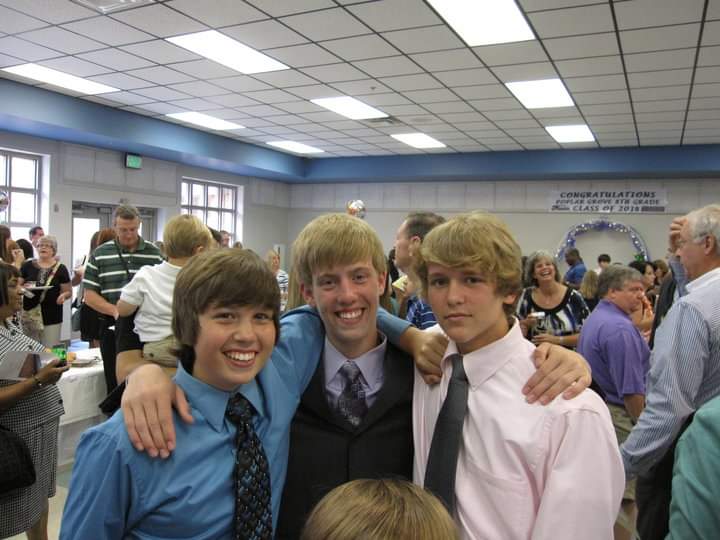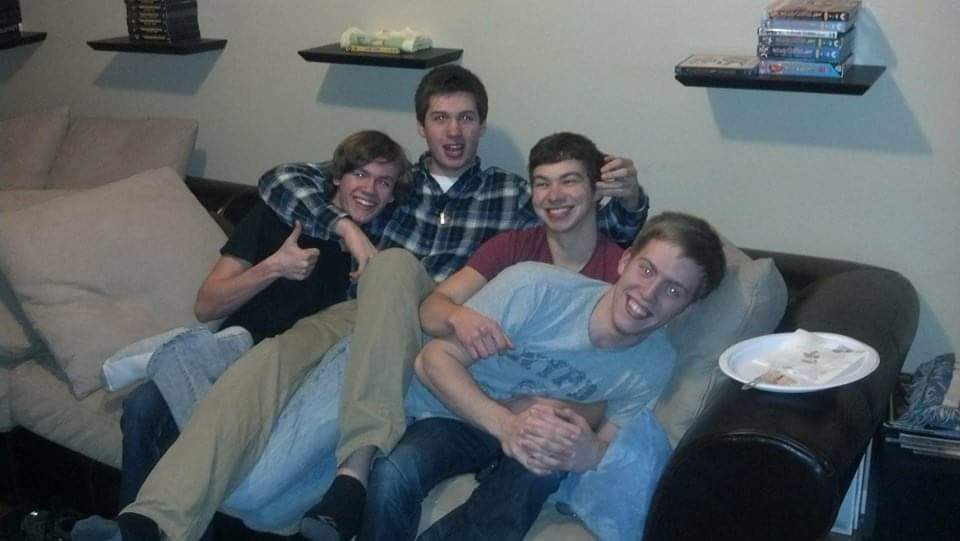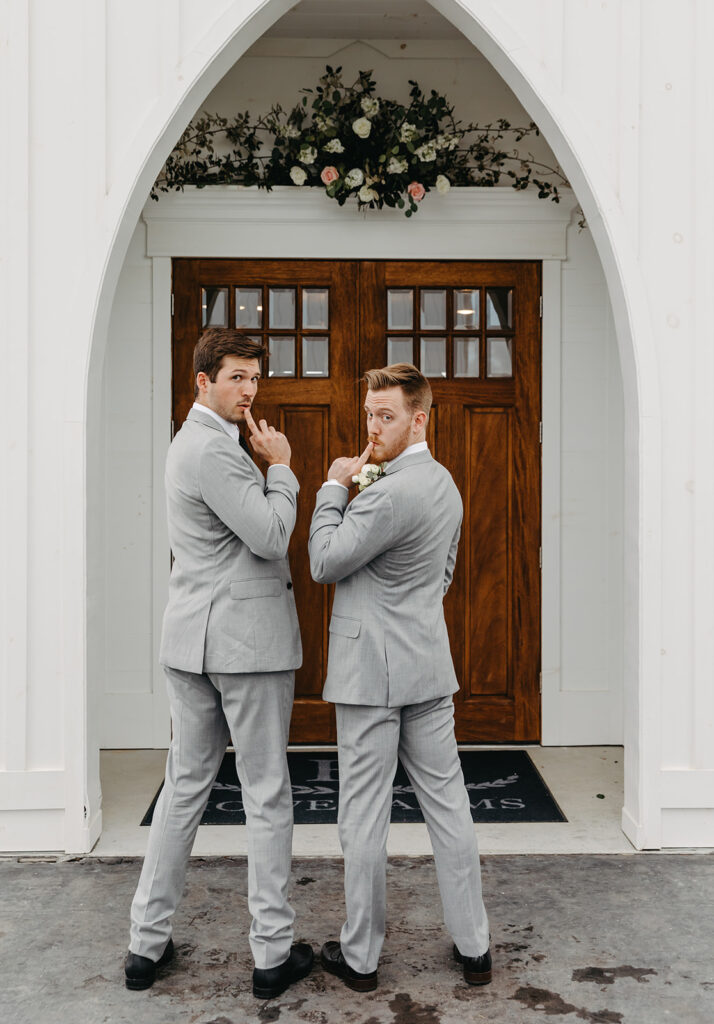On our Christmas tree (which has been up since before Thanksgiving) hangs an ornament I made when I was 6 years old. It is a paper star with my name written on it. My handwriting looks equally as bad today, so the “2001” written on the back is the only way to know I didn’t make it earlier this morning. This isn’t some prized ornament I’ve kept for years in hopes of one day putting it on my family tree as an adult. Rather, when I got married, it became time to partake in the age-old tradition of moving boxes from my parents’ attic to my attic. I had to sort through boxes and boxes of memories to decide which ones were worth remembering and which special moments weren’t special enough to take up precious storage space. Somehow, this paper star ornament was either worthy enough or small enough to make the cut and there it hangs on the tree.
While going through the other boxes pulled from the attic, I found my second grade class picture hidden amongst the report cards, baseball cards, and other handcrafted ornaments. Scanning those three rows of kids wearing baggy pants and gap-toothed grins, I found that after 20 years the name of almost every classmate was still stored in my brain, as untouched as all those participation trophies in the attic. The roster came flooding back to me instantly and effortlessly like the words to the pledge of allegiance. As someone whose memory has been crammed full of, and overtaken by, thousands of sports statistics and song lyrics, it was like discovering I still had a kid’s ability to ride my bike with reckless abandon or make imaginary friends.
Though I am not writing this from my parent’s attic, I can refer back to this exact class picture as our teacher from second grade posted it to her Facebook after the tragic passing of one of our classmates. Looking over the picture now, the dissonance between current perception and memory creates a strange double-exposure effect. I’m an adult now and can see these people for what they are, little kids. But I also see them, more vividly, as they were to me then, peers. They were, and in some way still are, other people in my world, as real and considerable as your co-workers are to you now. They were friends and enemies, jokesters and bullies. It still takes a perceptual effort, a kind of mental squinting, to see our teacher as a lively, not unpretty woman, around the same age I am now, instead of the authority figure who constantly separated me from my friend Brady for talking too much.
I’ve apparently been on a nostalgia bender recently as I enlisted the help of my friends to make a playlist of “Forgotten Bangers”. These are songs you likely haven’t heard in years, but when you do, they hit just right. Most nominations were based on the nostalgic feelings they brought on. For example, when “Gives You Hell” by All American Rejects was suggested, multiple guys reminisced about, and lamented, that song being the soundtrack of early childhood heartbreak. While I’d argue “Gives You Hell” is objectively good, I don’t know if I can separate the music from the feelings it elicits. In a similar way, I’ve heard about people who reconnect at reunions with classmates they were infatuated with in high school (“reconnect” being kind of a euphemism here). I’ve always been a little suspicious of those romances. Are they really attracted to each other or to the 16-year-olds they remember? Maybe it’s just the same sort of Pavlovian nostalgia that music brings on. However, there is something slightly depressing about the thought of two vanished adolescents belatedly consummating their desire through the medium of their middle-aged bodies.
I’ve encountered the same double-exposure effect that old class picture brought on in real life. One of my best friends is a guy named Keith whom I’ve known since we were kids. When Niki and I got married, Keith was an obvious choice for a groomsman. After our wedding, multiple ladies inquired about him to Niki and I, noting how attractive they found him. I couldn’t tell you what Keith objectively looks like anymore. I’m sure he really is a good looking dude, but looking at him is like trying to see letters as abstract shapes again once you’ve learned to read. All the accumulated memories of him: the short and goofy Keith I used to play basketball with in the driveway, the Keith in a cast after I accidentally broke his arm while wrestling in gym, the Keith that laughed at me all the way home after my car was hit in the parking lot of Franklin High School, the Keith who drove a 2002 Jaguar with a squeaky belt he’d have to put soap on every morning, Freshman year of college roommate Keith, and successful corporate Keith are superimposed over one another, blurring together to form the complex and beloved Keith in my mind. I’ve known him too long, and care about him too much, to see his mere, objective appearance anymore.
That said, I sometimes resent that old friends, like Keith, can also continue to see me as I was years ago, and not as the person I like to think I’ve become. Keith might see the Middle School me who thought he was hot stuff just because he hit puberty early, or High School me who was a bad friend for a while because I really wanted to be a jock and hang out with the other guys on the football team, or the college guy who thought he was a fitness icon. He can see all those guys superimposed over the man who is also trying to be a good husband to Niki. I have to hope Keith does not tell the story again about how I flew into a rage after my car got broken into to new people. He was the only witness to some of the most bizarre and weirdly specific threats my subconscious anger spit out. I don’t want him to tell that story not just because it was a hot headed and quite strange moment, but because I want to believe, and impress upon everyone, that that story is not about me anymore.
Those obsolescent perceptions feel stifling when you’re trying to change while old friends are exerting subtle pressure on you to remain the same. I want to add that Keith is not that kind of friend. He has always pushed me to be better while also keeping a shockingly detailed record of embarrassing stories which motivate me to improve. There’s some deep conservatism at work here, a denial of age and change. We’ve all seen or will see Home Alone this month as it’s the Christmas season. Maybe this is why Macaulay Culkin has not really had much adult success. He seems like a grotesque caricature of his iconic childhood self, as if disfigured by age. It’s especially infuriating when our families insist on seeing us as children, as though we are still, in adult age, in need of instruction in tasks like ordering in restaurants or stopping at stop signs. Maybe this is why a lot of people instantly revert to ill-tempered teens around their parents. You see people react with insanely disproportionate anger at seemingly inconsequential remarks made by siblings or spouses. They’re really reacting to the million previous remarks that all insinuated exactly the same thing. Our former selves live on in each other’s memories, like our favorite TV show characters long after the series has ended.
I’d suggest we even see ourselves at a delay. It’s hard to know what you really look like in the mirror because your 35, 24, and 11-year-old selves keep getting in the way. I am surprised every year when I play in our annual Turkey Bowl flag football game when I have to suddenly bend over and put my hands on my knees with a coppery taste in my mouth. I assume, when my buddy Tanner finally convinces me to get back to the gym, I will be equally surprised to find I can’t lift what I used to be able to lift.
It’s pretty well known that movies don’t actually move. They are rapid successions of pictures flashed before us in the dark. Each frame lingers on our eyes for an instant, so that the one we’ve just seen, now vanished, blends into the next, passing over the darkness between. It is only this brief afterimage that creates the illusion of continuity. Persistence of vision is the name of this idea. Similarly, we rely on each other’s perceptions of us to remind us who we are. Even if the afterimages of who we used to be are reductive, outdated, and insulting, they tie together who we are, who we used to be, and who we might become. This is why spending time with old friends like Keith feels so comfortable. It’s like lounging around the house wearing your most worn down old clothes all day. Their familiarity is a kind of external pressure that helps us retain our shape, countering the internal pressure not only to grow but to go astray or dissolve, to forget our true selves. “Someone needs to know us better than we know ourselves,” author Richard Russo wrote in the novel Straight Man. “We need them to say, ‘I know you, Al. You’re not the kind of man who….'”
That same stubborn resistance persists through life’s last and most unacceptable change. There’s some truth in the consoling cliché that people “live on in our memories.” They live on in our heads because that’s where they’ve always partly lived. We go on considering their wishes, fearing their disapproval, doing things just to annoy them for years after they’re gone. It’s really not that different from mourning the cute and sweet toddlers your standoffish teens used to be, or having real relationships with people who only live in your memories of the past.
I’m now writing this while home for the holidays. Also home are great friends I rarely see like Keith, Guha, and Mitch. Later next week we will spend some time in Niki’s college town and see one of her best friends, Sarah. Each reunion will serve as a reminder of not only who they are, but who we’ve always been to them. We will add a new image to superimpose over the rest. Our simultaneously real and imaginary friends will continue to live in our minds. I know Keith and Guha will be reading this and I hope they are proud that the young version of me they still kind of see has grown up a bit. And I hope they know I know as many embarrassing stories about them.


